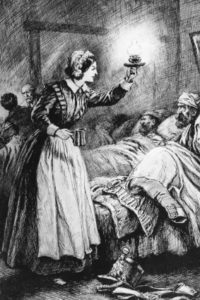Nursing is sometimes described as the “oldest of arts and the newest of professions.” The term nursing originally referred to acts of care giving and compassion. The word derives from Latin and means ‘to nourish.’
Although as a formal industry the field of home nursing and home care are relatively new, nursing done in the home setting dates back to the early 1600s when St. Vincent de Paul developed a ministry in which members didn’t remain cloistered, rather they went into the community to nurse the sick in their own homes. Early developments in the field of nursing are closely tied to the Church. Nurses sought to follow religious teachings which instructed them to care for others, help the sick, and provide assistance to those in need.
 Over the years it became clear that care alone was not enough to fully assist with the rehabilitation of sick patients. Nursing care began to take on a more medical role. The best known figure in the history of nursing is Florence Nightingale, an English nurse who is frequently credited as the founder of modern nursing. She was a staunch advocate for the rights and care of wounded soldiers during the Crimean War. Nightingale fought against social resistance and effectively saved the lives of many, many soldiers. She used her experiences to formulate what would eventually become the curriculum and theory of the first formal training programs for nurses and in 1860 the Nightingale Training School for Nurses was opened.
Over the years it became clear that care alone was not enough to fully assist with the rehabilitation of sick patients. Nursing care began to take on a more medical role. The best known figure in the history of nursing is Florence Nightingale, an English nurse who is frequently credited as the founder of modern nursing. She was a staunch advocate for the rights and care of wounded soldiers during the Crimean War. Nightingale fought against social resistance and effectively saved the lives of many, many soldiers. She used her experiences to formulate what would eventually become the curriculum and theory of the first formal training programs for nurses and in 1860 the Nightingale Training School for Nurses was opened.
Today there are many different options in education for nurses, however all practicing nurses must hold specific credentials. A Licensed Practical Nurse (LPN) must hold a high school diploma and must successfully complete an LPN training course, which typically takes about one year and involves classroom lecture as well as hands-on practical skills instruction. LPNs often work under the supervision of Registered Nurses. A Registered Nurses (RN) has extensive training and must hold an advanced degree, for example an Bachelor of Science in nursing. Training to become a registered nurse typically requires four years. Sometimes RNs specialize in a particular field of medicine, others practice in a variety of settings.
According to the American Nurses Association “nursing is the protection, promotion, and optimization of health and abilities; prevention of illness and injury; alleviation of suffering through diagnosis and treatment of human responses; and advocacy in health care for individuals, families, communities, and populations.”
The nursing profession draws on science, theory, social factors and developing technologies to best serve the healthcare needs of patients. Nurses provide care to patients in all stages of health and wellness across a wide variety of healthcare settings. The field of nursing has evolved into a critical component of the current healthcare system.

